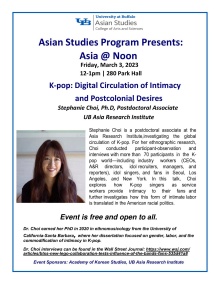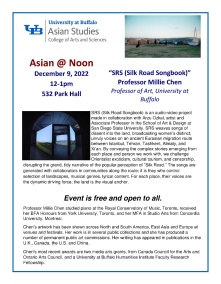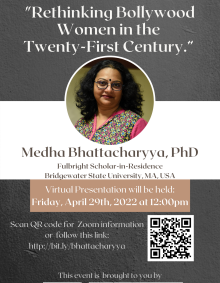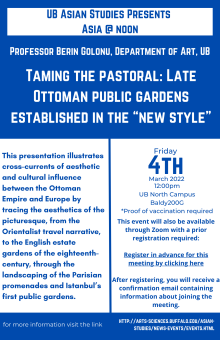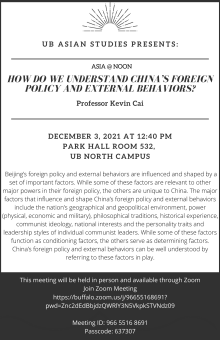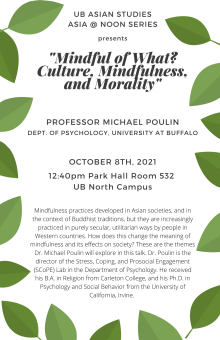Asia @ Noon
Asia@Noon talks are held many Fridays throughout the academic year held in various rooms across North Campus. The presenter usually speaks for about 45 minutes, with time for discussion at the end of each talk. Undergraduates, graduate students, faculty, and people from the Buffalo community are invited and encouraged to attend. If you are a scholar of Asia-related research, we invite you to contact us about speaking at Asia@Noon.

Monumental Faith: The Texts of the Taj Mahal: Selection and Significance
Fr. Michael Calabria
Date: November 8, 2024
Time: 12–1 p.m.
Location: 280 Park Hall, UB North Campus
In June 1631, just three years into his reign, Mughal emperor Shah Jahan experienced the greatest tragedy of his life: the death of his beloved wife Mumtaz Mahal. To honor her memory, he constructed a vast funerary complex known today as the Taj Mahal. Inscribed with fourteen complete surahs of the Qur’an and assorted verses from several other surahs, the Taj Mahal bears the most extensive inscriptional program of any Islamic monument in South Asia. Rendered into calligraphy of outstanding beauty, the texts comprise in essence Shah Jahan’s Qur’an, an elegant expression of his Islamic faith. Drawing upon historical records, hadith and tafsir literature, this presentation explores both the reasons for the selection of these texts, their placement within the complex, their significance for Shah Jahan and for the world today.
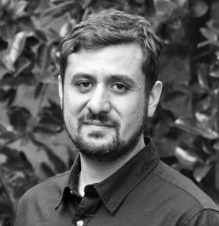
The Right to Information and Struggles over COVID-19 Vaccination in India
Aniket Pankaj Aga, PhD
Assistant Professor, Department of Geography
Date: October 25, 2024
Time: 12–1 p.m.
Location: 280 Park Hall, UB North Campus
After decades of struggles by environmental and justice movements, India enacted the Right to Information (RTI) Act in 2005, which opened large government files to public disclosure and scrutiny for the first time. Although scholars have generally dismissed such transparency laws as symptomatic of neoliberal economic agendas, this talk will argue that struggles around information and transparency must be contextualized in the historical sociology of state power and corporate capital. Prof. Aga examines specifically how lawyers, journalists, researchers, and activists engaged the state via the RTI Act on the issue of COVID-19 relief and mitigation, as well as the state’s responses. He suggests that struggles over information, far from floundering against the limits of neoliberal governance, have, in fact, effectively diagnosed the actual, non-liberal character of India’s political economy, revealing the act’s transformative potential.
Past Events
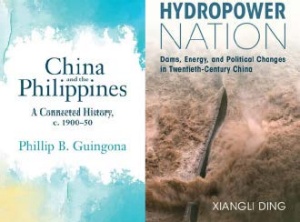
"Managing Rivers and Traversing Oceans: New Perspectives on International Exchange and Environmental Change in Asia"
UB PhD Alumni Panel
Date: September 13, 2024
Time: 12-1 p.m.
Place: 280 Park Hall
The Asia Research Institute and Asian Studies Program, along with the Department of History, are pleased to welcome back to campus two UB alumni to discuss their recently published monographs.
Dr. Phillip Guingona will present his work on “China and the Philippines: A Connected History, c. 1900–50” (Cambridge University Press 2023), and Dr. Xiangli Ding will discuss his recent book, “Hydropower Nation: Dams, Energy, and Political Changes in Twentieth-Century China” (Cambridge University Press 2024).
Phillip Guingona (UB PhD 2015) is an assistant professor in the Department of History, Politics, and Law at Nazareth University. Xiangli Ding (UB PhD 2018) is an associate professor in the Department of History, Philosophy and the Social Sciences at Rhode Island School of Design.
Dr. Aki Nakamura, "The Creation of the Global IP in the Japanese Entertainment Industry: From Mukokuseki to Co-Creation"
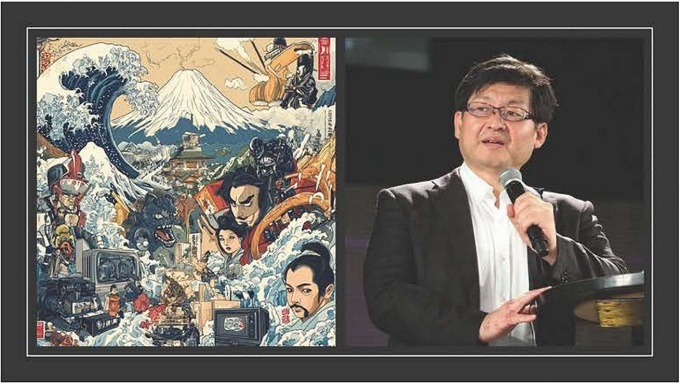
Date: September 6, 2024
Time: 12-1 p.m.
Place: 280 Park Hall
From Pokémon to Demonslayer, games, anime and character goods from Japan seem to be everywhere in the world, providing an entertainment alternative to what has long been the dominant entertainment content enriching the lives of people around the world: Hollywood. movies. However, such content did not emerge overnight, and there is a reason why this type of entertainment was created and developed in Japan. This presentation will show how different aspects of Japanese culture have enabled the Japanese to interpret and adapt Western media and transform them.
Akinori Nakamura is a professor at the College of Image Arts and Sciences at Ritsumeikan University. He specializes in the globalization of digital media and games, with a particular emphasis on the development and evolution of the gaming industry in China. His work explores the intersection of cultural influences, technological advancements, and regulatory environments, highlighting how these factors shape gaming ecosystems worldwide.

Date: Ocotber 20, 2023
Time: 12-1 p.m.
Place: 280 Park Hall
In this talk, I first show that several early Chinese thinkers take the training of both attentional control and specific habits of attention to be crucial to the process of developing one’s ethical character. After explaining these views of attention, I argue that they are largely empirically supportable. I conclude by arguing that there are important normative upshots that follow from accepting such views of attention, including the need to develop what I call “an ethics of attention”.

Date: October 13, 2023
Time: 12-1 p.m.
Place: 280 Park Hall
Abstract: TBA
Dr. Zhongtian Han is Visiting Assistant Professor of Chinese History at Department of History, University at Buffalo. Zhongtian is a historian of modern China, specialized in the Chinese Communist revolution, science and technology, and intelligence. His work on these topics has been published in War in History. Zhongtian’s book project, Institutionalization within Revolution: The Chinese Communist Party’s Radio Communications and Reconnaissance, 1930–1953, uses Chinese, Japanese, and English-language archival sources to analyze how the Party employed radio technologies to create an institutional framework to centralize the revolutionary movement and seize intelligence advantages in military struggles. His second book project explores how the Party developed the intellectual and institutional frameworks of meteorology to build a knowledge infrastructure for the socialist state in the 1950s and 1960s.
Before joining University at Buffalo, Zhongtian received his PhD in history from George Washington University. He was also a Hans J. Morgenthau fellow of grand strategy at the University of Notre Dame. Additionally, Zhongtian has been the instructor of record for graduate and undergraduate Asian history courses at the University of Pennsylvania and the University of Maryland, College Park.
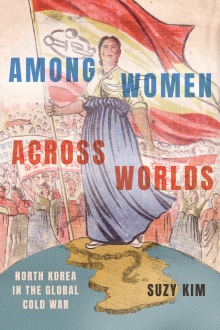
Asia@Noon
Friday April 28, 2023
12:00-1:30pm
280 Park Hall
Among Women across Worlds: North Korea in the Global Cold War
Suzy Kim, PhD, Associate Professor of Korean History,
Rutgers University
While both feminism and pacifism may appear to have stagnated in the 1950s with the rise of Cold War domesticity and McCarthyism, the Korean War galvanized women to promote women’s rights in the context of the first global peace campaign during the Cold War. Recuperating the erasure of North Korean women from this movement, this talk excavates buried histories of Cold War sutures to show how leftist women tried to bridge the Cold War divide through maternalist strategies. Socialist feminism in the context of a global peace movement facilitated a productive understanding of “difference” toward a transversal politics of solidarity. The talk weaves together the women’s press with photographs and archival film footage to contemplate their use in transnational movements of resistance and solidarity, both then and now.
Suzy Kim is a historian and author of the prize-winning book Everyday Life in the North Korean Revolution, 1945-1950 (Cornell 2013). She holds a PhD from the University of Chicago, and teaches at Rutgers, the State University of New Jersey in New Brunswick. Her newest book Among Women across Worlds: North Korea in the Global Cold War (Cornell 2023) was completed with the support of the Fulbright Program and the National Endowment for the Humanities.
Event is free and open to all!
Co-sponsors: Asia Research Institute, the Academy of Korean Studies, the Department of Global Gender and Sexuality Studies, and the Department of History

Asia@Noon
Friday March 31, 2023
12-1pm
280 Park Hall
Manga, Murder and Mystery: The Boy Detectives of Japan's Lost Generation
Mimi Okabe, PhD, Clinical Assistant Professor
Asian Studies Program
Mimi Okabe is an award-winning teacher who is now a clinical assistant professor of Japanese Cultural Studies at the University at Buffalo in the Asian Studies Program. She teaches courses such as Anime and Japanese popular culture! Her forthcoming book, Manga, Murder and Mystery (July 2023) advances new insight in Japanese Studies and detective fiction criticism, as it explores children’s mystery stories appearing in Japanese manga, tracing the literary figure of the boy detective over the course of Japan’s ‘lost decade’ (1990 – 2001) to explore broader social expectations of youth in contemporary Japan. Aside from her academic work, Mimi is also the co-founder of Japanese for Nikkei, an online education platform for the global Japanese diaspora. For updated CV, publication & research activities, please visit her website: mimiokabe.com
Event is free and open to all!
Asia @ Noon
Friday, March 3, 2023
12-1pm 280 Park Hall
K-pop: Digital Circulation of Intimacy and Postcolonial Desires
Dr. Stephanie Choi, Postdoctoral Associate UB Asia Research Institute
Stephanie Choi is a postdoctoral associate at the Asia Research Institute,investigating the global circulation of K-pop. For her ethnographic research, Choi conducted participant-observation and interviews with more than 70 participants in the Kpop world—including industry workers (CEOs, A&R directors, idol recruiters, managers, and reporters), idol singers, and fans in Seoul, Los Angeles, and New York. In this talk, Choi explores how K-pop singers as service workers provide intimacy to their fans and further investigates how this form of intimate labor is translated in the American racial politics.
Event is free and open to all.
Dr. Choi earned her PhD in 2020 in ethnomusicology from the University of California-Santa Barbara, where her dissertation focused on gender, labor, and the commodification of intimacy in K-pop.
Dr. Choi interviews can be found in the Wall Street Journal: https://www.wsj.com/ articles/btss-new-lego-collaboration-tests-influence-of-the-bands-fans-535d41a8
Event Sponsors: Academy of Korean Studies, UB Asia Research Institute
Asia @ Noon
Friday, February 3, 2023
12-1pm 280 Park Hall
The Past, Present, and Future of South Asian Studies in South Korea
Professor Taejin Koh
Professor Taejin Koh, Hankuk University of Foreign Studies South Asian Studies in Korea has tended to focus on Buddhism, Indian philosophy, history, and economics. Recently, however, the lack of interest in the humanities has led to the collapse of the research base, and we observe that fewer young scholars are entering the field. This presentation will explore possible new directions for South Asian Studies in South Korea and beyond. Event is free and open to all. Professor Taejin Koh is Head of the Hindi Department at Hankuk University of Foreign Studies. He received his Ph.D. in Linguistics from Delhi University and publishes widely on Hindi and tribal languages of South Asia
Asia @ Noon
December 9, 2022
532 Park Hall
“SRS (Silk Road Songbook)”
Professor Millie Chen
Professor of Art, University at Buffalo
SRS (Silk Road Songbook) is an audio-video project made in collaboration with Arzu Ozkal, artist and Associate Professor in the School of Art & Design at San Diego State University. SRS weaves songs of dissent into the land, broadcasting women’s distinct, unruly voices on an ancient Eurasian migration route between Istanbul, Tehran, Tashkent, Almaty, and Xi’an. By conveying the complex stories emerging from each place and person we work with, we challenge Orientalist exoticism, cultural tourism, and censorship, disrupting the grand, tidy narrative of the popular perception of “Silk Road.” The songs are generated with collaborators in communities along the route; it is they who control selection of landscapes, musical genres, lyrical content. For each place, their voices are the dynamic driving force; the land is the visual anchor.
This event is part of International Education Week.
Event is free and open to all.
Professor Millie Chen studied piano at the Royal Conservatory of Music, Toronto, received her BFA Honours from York University, Toronto, and her MFA in Studio Arts from Concordia University, Montreal.
Chen’s artwork has been shown across North and South America, East Asia and Europe at venues and festivals. Her work is in several public collections and she has produced a number of permanent public art commissions. Her writing has appeared in publications in the U.K., Canada, the U.S. and China.
Chen's most recent awards are two media arts grants, from Canada Council for the Arts and Ontario Arts Council, and a University at Buffalo Humanities Institute Faculty Research Fellowship.
Asia @ Noon Event
April29th, 2022 at 12:00pm
ZOOM
Professor Medha Bhattacharyya, PhD, Fulbright Scholar-in-Residence Bridgewater State University, MA
"Rethinking Bollywood Women in the Twenty-first Century.”
Organized by the University at Buffalo Asian Studies Program
More information to come!
Asia @ Noon Event
March 4th, 2022 at 12:00pm in Baldy 200G
Professor Berin Golonu, of Department of Art, UB presents:
Taming the pastoral: Late Ottoman public gardens established in the “new style"
Organized by the University at Buffalo Asian Studies Program
In 1867, the Ottoman Sultan and the Viceroy of Egypt visited Paris to attend the opening festivities of the Exposition Universelle. These statesmen marveled at Paris’ urban renewal under Baron Haussmann, and endeavored to replicate some of the symbols of its urban reform in Istanbul and Cairo. Within three years, the first private and public gardens inspired by the design of the Parisian promenades had been created Istanbul. This presentation illustrates cross-currents of aesthetic and cultural influence between the Ottoman Empire and Europe by tracing the aesthetics of the picturesque, from the Orientalist travel narrative, to the English estate gardens of the eighteenth-century, through the landscaping of the Parisian promenades and Istanbul’s first public gardens.
This event will be avilable through Zoom with a prior registration required:
Register in advance for this meeting by clicking here
After registering, you will receive a confirmation email containing information about joining the meeting.
Asia@Noon Event
December 3rd, 2021 at 12:40
Professor Kevin Cai will present:
How Do We Understand China’s Foreign Policy and External Behaviors?
Organized by the University at Buffalo Asain Studies Program
Beijing’s foreign policy and external behaviors are influenced and shaped by a set of important factors. While some of these factors are relevant to other major powers in their foreign policy, the others are unique to China. The major factors that influence and shape China’s foreign policy and external behaviors include the nation’s geographical and geopolitical environment, power (physical, economic and military), philosophical traditions, historical experience, communist ideology, national interests and the personality traits and leadership styles of individual communist leaders. While some of these factors function as conditioning factors, the others serve as determining factors. China’s foreign policy and external behaviors can be well understood by referring to these factors in play.
This event will be held in person and available through Zoom:
Join Zoom Meeting
https://buffalo.zoom.us/j/96655168691?pwd=Znc2dEdBbjdzQWRlY3N5VkpkSTVNdz09
Meeting ID: 966 5516 8691
Passcode: 637307
Asia@Noon Event
October 8th, 2021 at 12:40pm in Park 532
Professor Michael Poulin, of the Department Psychology, UB presents:
"Mindful of What? Culture, Mindfulness, and Morality"
Organized by the University at Buffalo Asian Studies Program
Mindfulness practices developed in Asian societies, and in the context of Buddhist traditions, but they are increasingly practiced in purely secular, utilitarian ways by people in Western countries. How does this change the meaning of mindfulness and its effects on society? These are the themes Dr. Michael Poulin will explore in this talk. Dr. Poulin is the director of the Stress, Coping, and Prosocial Engagement (SCoPE) Lab in the Department of Psychology. He received his B.A. in Religion from Carleton College, and his Ph.D. in Psychology and Social Behavior from the University of California, Irvine. His research interests focus on understanding the resources that people use to adjust to adversity, as well as what motivates people to respond to the adversity of others.
